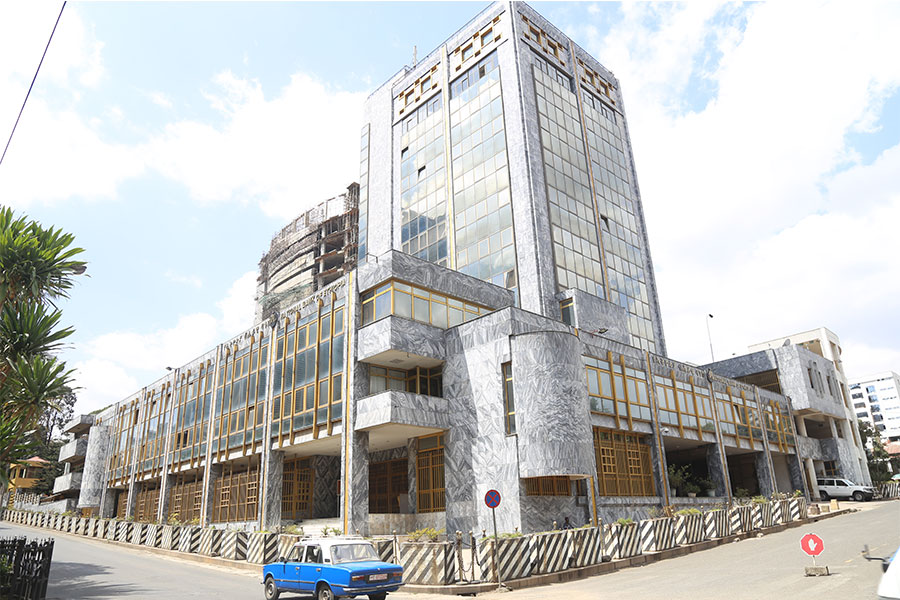
Mar 30 , 2024.
Ethiopian authorities find themselves at a crossroads in the shadow of a global economic malaise characterised by sluggish growth and persistently high inflation. Much like several other countries, the economy they are in charge of is not insulated from the intertwining traps of the current era. They face a formidable choice to steer clear of an economic landscape riddled with domestic and international pressure.
Among the most pressing is the daunting task of securing adequate financing immediately to fix current account imbalances, particularly the disparity between imports and exports. It is a scenario further complicated by the need to deal with an entrenched black-market premium for the Birr against a basket of major currencies and the looming obligation of a one-billion Eurobond repayment.
The International Monetary Fund (IMF), traditionally seen as a financial lifeline in such predicaments, has its team of experts in town, currently engaging with the administration's macroeconomic team: Girma Birru, Teklewold Atnafu, Mamo Mehiretu, Festume Assefa (PhD), Ahmed Shedie and Eyob Tekalegn (PhD). The much-anticipated engagement, supposedly conducted with the gravitas of negotiations with an entity known for its stringent conditions, hopes to forge a path through the economic hurricane.
However, both parties could be aware that any agreement will not serve as a silver bullet. While aimed at stabilising economies, the anticipated "shock therapy" proposed by the IMF team often comes with its own set of aftershocks, as evidenced by its implementation in other countries. If successful, Ethiopia will join no less than 35 countries, such as Egypt, Zambia, Ghana, and Pakistan, which have received 200 billion dollars in loans.
The IMF's intervention is predicated on a cocktail of measures designed to combat entrenched inflation, cut budget deficit, and sail the choppy waters of climate change, geopolitical tensions, and a sluggish global economy. The lack of fiscal space and a precarious debt situation only add to the troubling waters of Ethiopia's predicament. Despite these crises, or perhaps because of them, Governor Mamo of the Central Bank has been proactive lately, appearing determined to address them head-on. His recent unusual moves, such as the publication of two distinct sets of data on inflation and the impacts of recent monetary policy measures, could signal him being in action, clinching his fist to stabilise the economy.
The first data paints a picture of an inflation trajectory that has seen its fair share of fluctuations over the past year, starting with a modest increase and peaking significantly before taking a volatile descent. The inflationary rates trend reflects the impact of tighter monetary policies over recent months, pointing towards a potential easing of inflationary pressures if these trends continue. Concurrently, the Central Bank's adjustments to monetary policy have begun to show their intended effect, decelerating the growth of key monetary indicators.
This may imply the effectiveness of these measures, although the broader economic implications remain to be seen. The struggle to control inflation and nurture economic growth encapsulates the delicate dance of macroeconomic management. However, the path forward will not be any easier for the Governor and his team of monetary policy advisors.
While welcome, the reduction in inflation rates belies underlying supply-side constraints that must be navigated carefully to avoid unintended consequences. The challenge lies in managing these constraints without stifling the private sector's expansion ambitions, particularly in industries reliant on credit. Last year, the Central Bank's accommodative monetary stance led to significant growth in the money supply, driven by an expansion in domestic credit and significant public borrowing.
The expansion, while necessary, carries the risk of exacerbating inflationary pressures if not managed prudently.
The banking industry, a mix of state-owned and private entities, has also seen significant growth over the years, perhaps reflecting a broader trend of financial deepening. Its growth, however, is accompanied by risks, particularly in managing the cost of capital and ensuring that investment remains viable in a high-interest environment. The recent policy shift towards tighter monetary conditions appears to have targeted these risks, balancing the need for economic stability with the imperative of growth. Governor Mamo's policy of capping lending growth to 14pc of the banks' aggregate loans might have brought relief by taming the inflationary rate.
The cost, however, is a sector-wide slowdown and potentially affecting macroeconomic growth.
A perennial challenge for Ethiopia continues to be the widening trade deficit, driven by a mix of factors, including rising imports and structural constraints in the economy. This is further exacerbated by a significant allocation of resources to defence and debt servicing sectors, at the expense of social spending. The erosion of the social safety net amidst these fiscal pressures unearthed the difficult trade-offs facing policymakers in a constrained economic environment.
The adverse impact of these combined shocks on poverty cannot be overstated. Ethiopia's progress in poverty reduction, a noteworthy achievement in the decades leading up to 2020, has been reversed by a confluence of shocks that have eroded household purchasing power and deepened disparities across regional states and demographics. It should be regrettable, considering that the task ahead is not only to stabilise the national economy but also to make a turnaround on the deepening crisis of poverty and food insecurity. The United Nations estimated that nearly four billion dollars is required to support 21.4 million people in need, of whom close to 40 percent are children.
Responding to these myriad problems demands a multi-pronged strategy and an overriding philosophy of political economy. Where there is a vacuum in a guiding conviction, the triumph from the judiciously managed monetary policy to keep inflation in check can only be fleeting. The political-economy beacon should guide a fiscal discipline to prioritise high-impact public investments that generate jobs. It should serve as a lighthouse for enhancing domestic savings, diversifying the economy, investing in human capital, and improving domestic revenue mobilisation. No less, it is crucial to engage the private sector, which can complement public investments and spur growth.
Prime Minister Abiy Ahmed's (PhD) administration appears to be at a defining moment. The choices made now - not painless by any measure - will have far-reaching implications for the country's economic future, its ability to overcome the twin challenges of growth and stability, and the fate of its people.
PUBLISHED ON
Mar 30,2024 [ VOL
24 , NO
1248]

Fortune News | Mar 30,2024

Radar | Jul 11,2021

Fortune News | Mar 16,2019

Radar | May 25,2019

News Analysis | Jul 03,2021

My Opinion | 131673 Views | Aug 14,2021

My Opinion | 128039 Views | Aug 21,2021

My Opinion | 126001 Views | Sep 10,2021

My Opinion | 123622 Views | Aug 07,2021

Dec 22 , 2024 . By TIZITA SHEWAFERAW
Charged with transforming colossal state-owned enterprises into modern and competitiv...

Aug 18 , 2024 . By AKSAH ITALO
Although predictable Yonas Zerihun's job in the ride-hailing service is not immune to...

Jul 28 , 2024 . By TIZITA SHEWAFERAW
Unhabitual, perhaps too many, Samuel Gebreyohannes, 38, used to occasionally enjoy a couple of beers at breakfast. However, he recently swit...

Jul 13 , 2024 . By AKSAH ITALO
Investors who rely on tractors, trucks, and field vehicles for commuting, transporting commodities, and f...

Jun 29 , 2025
Addis Abeba's first rains have coincided with a sweeping rise in private school tuition, prompting the city's education...

Jun 29 , 2025 . By BEZAWIT HULUAGER
Central Bank Governor Mamo Mihretu claimed a bold reconfiguration of monetary policy...

Jun 29 , 2025 . By BEZAWIT HULUAGER
The federal government is betting on a sweeping overhaul of the driver licensing regi...

Jun 29 , 2025 . By NAHOM AYELE
Gadaa Bank has listed 1.2 million shares on the Ethiopian Securities Exchange (ESX),...